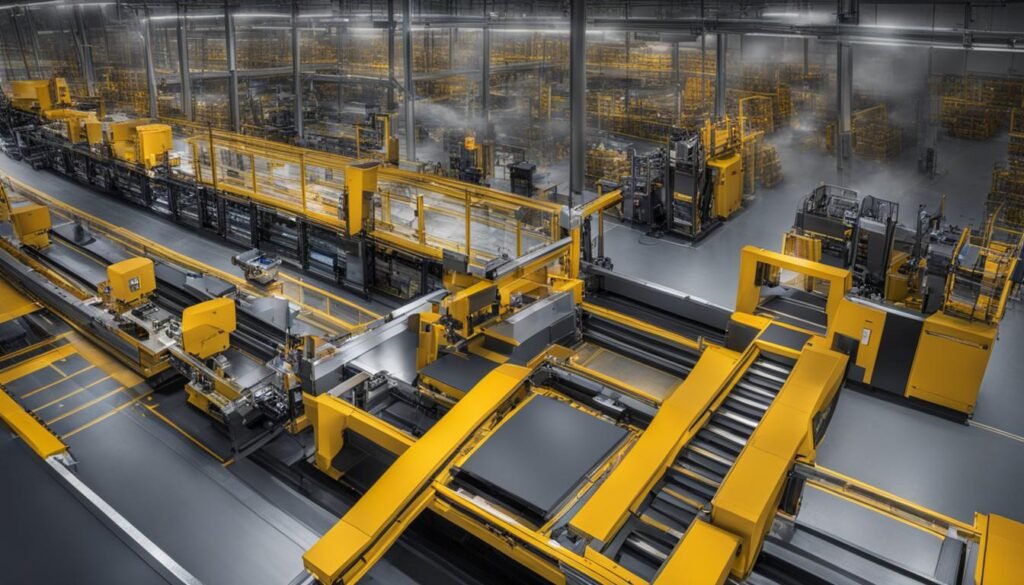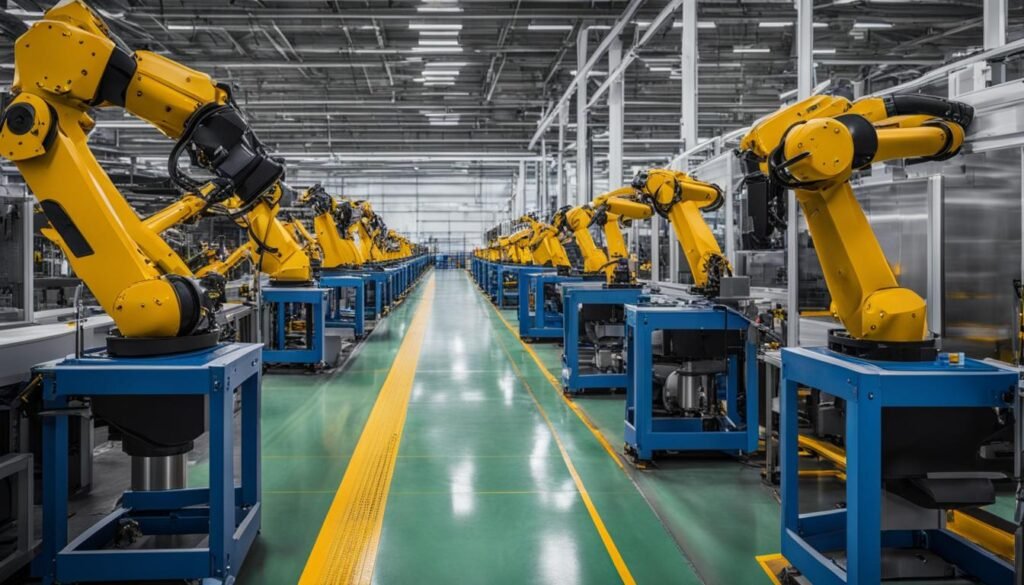Advanced robotics technology is shaping the future of industries and our daily lives. With significant advancements in AI and machine vision, the potential for innovation and efficiency is immense. From space exploration to healthcare, robotics has found its way into various sectors, revolutionizing the way we work and live.
Robotics in industries has the power to create new job opportunities and transform the global economy. According to the World Economic Forum, AI could generate 58 million jobs, while robotics could create 133 million new roles. These technologies are not just tools but catalysts for progress and economic growth.
Key Takeaways:
- Advanced robotics technology is driving innovation and efficiency in various industries.
- AI and machine vision advancements play a crucial role in the development of advanced robotics.
- The World Economic Forum predicts the creation of millions of new jobs through AI and robotics.
- Robotics in industries have the potential to transform the global economy.
- These technologies are catalysts for progress and economic growth.
The Evolution of Automation and Advanced Robotics

The history of automation and robotics spans centuries, starting from the invention of mechanical devices in ancient times to the Industrial Revolution. However, it was not until the 1920s that the term “robot” was coined, marking the beginning of a new era in robotics. The first industrial robot was introduced in the 1960s, laying the foundation for the modern advancements we see today.
Today, automation and advanced robotics are driven by breakthroughs in artificial intelligence (AI) and machine learning. These technologies have revolutionized various industries, leading to remarkable advancements in efficiency, accuracy, and productivity. AI and machine learning algorithms enable robots to learn and adapt, making them more capable and versatile than ever before.
The History of Robotics
The history of robotics can be divided into several key periods:
- Pre-industrial era: Mechanical devices were developed in ancient civilizations, such as the water-powered devices in ancient Greece and the mechanical inventions of the ancient Chinese.
- Industrial Revolution: The invention of automated machines during the Industrial Revolution paved the way for the mass production of goods and the rise of manufacturing industries.
- The birth of robotics: The term “robot” was first used in the 1920s by Czech playwright Karel Čapek in his play “R.U.R.” (Rossum’s Universal Robots).
- First industrial robot: The first programmable industrial robot, Unimate, was introduced in the 1960s by George Devol and Joseph Engelberger. It revolutionized manufacturing processes and set the stage for the future of robotics.
Advancements in AI and Machine Learning
In recent years, advancements in AI and machine learning have propelled the field of robotics to new heights. These breakthroughs have enabled robots to perform increasingly complex tasks, such as natural language processing, object recognition, and even autonomous decision-making. With AI and machine learning algorithms, robots can learn from data and previous experiences, making them more adaptable and intelligent.
The future of robotics is closely intertwined with the evolution of Web3 and AI. Web3, the decentralized web, promises to unleash the full potential of automation and advanced robotics. It envisions a world where robots can seamlessly interact with each other, collect and share data, and collaborate on complex tasks. This interconnectedness will lead to further advancements in robotics and redefine the way we live and work.
The Benefits of Automation and Advanced Robotics
Automation and advanced robotics offer numerous benefits to society, revolutionizing industries and driving economic growth. Here are some key advantages:
- Increased Efficiency: Automation allows for the automation of repetitive tasks, reducing human error and improving overall efficiency. This frees up human resources to focus on more complex and creative endeavors, leading to higher productivity.
- Economic Growth: The integration of automation and advanced robotics stimulates economic growth by streamlining processes, reducing costs, and increasing output. It creates wealth and job opportunities in industries that utilize these technologies.
- Opportunities for Innovation: Automation and robotics provide opportunities for innovation and creativity. By automating mundane and repetitive tasks, individuals can devote more time and energy to developing new ideas and finding more efficient ways of doing things.
- Productivity: Advanced robotics technologies enable businesses to achieve higher levels of productivity. They can work faster, for longer periods, and with greater precision than humans, resulting in improved quality of goods and services.
Applications in Different Industries
Automation and advanced robotics have been widely adopted in various industries, further magnifying their benefits:
- Manufacturing: Robots are extensively used in manufacturing for tasks such as assembly lines, welding, and material handling. This has led to increased production capacity, improved quality control, and reduced costs.
- Healthcare: Robotics play a vital role in healthcare, assisting in surgeries, physical therapy, and patient care. They help enhance precision, reduce risks, and enable healthcare professionals to provide better treatment.
- Logistics and Warehousing: Automation and robotics streamline processes in logistics and warehousing, improving efficiency in inventory management, order fulfillment, and transportation. This results in faster delivery times and reduced errors.
- Construction: Advanced robotics technology is increasingly being used in construction for tasks such as bricklaying, demolition, and site inspection. This improves safety, reduces labor costs, and accelerates project completion.
These are just a few examples of how automation and advanced robotics are reshaping industries and bringing about positive changes in our society. The benefits of these technologies extend beyond increased efficiency and productivity, paving the way for a brighter future of innovation and economic growth.
The Ethical Implications of Automation and Advanced Robotics
As automation and advanced robotics continue to advance, there are important ethical implications that must be considered. One of the primary concerns is job displacement. With increased automation, there is a risk of unemployment for many workers. This can lead to economic inequality and social unrest if not addressed properly.
Privacy concerns are also significant in the age of automation and robotics. These technologies collect and process vast amounts of data, raising questions about how that data is used and protected. It is crucial to establish strict regulations and safeguards to ensure the privacy and security of individuals and businesses.
Furthermore, there is a potential for dehumanization in a highly automated society. As tasks become more automated and robotic, the human element may be diminished. This raises questions about the impact on human relationships, empathy, and the overall quality of life. It is essential to strike a balance between technological advancements and preserving our humanity.
To address these ethical implications, it is necessary to have thoughtful discussions and involve diverse stakeholders. Governments, organizations, and society as a whole must work together to find solutions that minimize job displacement, ensure privacy and security, and preserve our humanity in the face of automation and advanced robotics.
Case Studies: Automation and Advanced Robotics in Action
The implementation of automation and advanced robotics has revolutionized various industries, bringing forth increased efficiency, precision, and innovation. Let’s explore some compelling case studies that showcase the practical applications and positive impact of these technologies:
1. Building Automation:
Building automation and management systems (BAMSs) are intelligent systems used to control and monitor various building functions. These technologies optimize energy efficiency, improve operations, and enhance occupant comfort. Through the integration of advanced robotics, BAMSs can analyze data in real-time, adjusting lighting, temperature, and ventilation systems accordingly. This not only reduces energy consumption but also promotes a sustainable and eco-friendly approach to building management.
2. Healthcare Robotics:
In the healthcare industry, robotics has become an invaluable asset, assisting medical professionals in numerous ways. Surgical robots, for example, provide unparalleled precision during complex procedures, minimizing invasiveness and accelerating patient recovery. Additionally, robots are utilized for physical therapy, aiding patients in their rehabilitation journey. With the recent global pandemic, healthcare robotics has emerged as a critical tool for remote patient monitoring, disinfection, and even delivering medical supplies in highly sensitive environments.
3. Manufacturing Robotics:
The manufacturing industry has long embraced automation and advanced robotics as a means to enhance productivity and streamline operations. Robots are employed for tasks such as assembly lines, arc welding, and material handling, where they consistently deliver high-quality outputs with unmatched speed and precision. By automating repetitive and physically demanding tasks, human workers can be allocated to more complex and creative roles, leading to increased job satisfaction and overall manufacturing efficiency.
These case studies exemplify the transformative potential of automation and advanced robotics across various sectors. The integration of these technologies not only enhances productivity and efficiency but also provides opportunities for innovation and improved quality of life. As automation continues to evolve, it is essential to explore new applications and optimize the collaborative potential between humans and robots. Through responsible implementation and ongoing advancements, automation and advanced robotics will undoubtedly shape the future of industries and pave the way for new possibilities.
The Future of Work in an Automated Society

The rapid advancement of automation and advanced robotics is reshaping the job market and raising questions about the future of work. As technology continues to evolve, it is crucial for individuals and society as a whole to adapt and prepare for the changing landscape. Here are key factors to consider:
1. Job Market:
The job market is undergoing a transformation as automation replaces certain tasks traditionally performed by humans. While this may lead to job displacement in some sectors, it also creates new opportunities in emerging fields. It is essential for individuals to stay informed about evolving job trends and seek out roles that require uniquely human skills, such as problem-solving, creativity, and emotional intelligence.
2. Retraining Programs:
Retraining and upskilling programs play a vital role in helping individuals navigate the shifting job market. These programs provide the necessary training and resources for workers to acquire new skills and transition into different industries or roles. Governments, educational institutions, and private organizations can collaborate to develop comprehensive retraining initiatives that address the specific needs of individuals affected by automation.
3. Future Skills:
In an automated society, possessing a diverse set of future skills will be essential for career success. These skills include critical thinking, adaptability, digital literacy, and the ability to collaborate effectively with intelligent machines. Continuous learning and embracing lifelong education will be crucial as technology continues to advance and shape the nature of work.
4. Robots as Collaborators:
Rather than viewing robots as direct competitors, there is a growing recognition of their potential as collaborators with humans. As automation takes over repetitive tasks, individuals can work alongside robots, leveraging their capabilities to enhance productivity and efficiency. This collaborative approach allows humans to focus on higher-level tasks that require creativity, judgment, and complex problem-solving.
Policy and Regulation for Automation and Advanced Robotics
The rapid advancements in automation and advanced robotics have brought about numerous ethical implications that require careful consideration. As these technologies become increasingly integrated into our daily lives, it is crucial to establish robust policy frameworks and regulations to ensure their responsible use.
Developing ethical frameworks is a vital step in addressing the potential risks and challenges associated with automation and advanced robotics. These frameworks can guide policymakers and industry stakeholders in making informed decisions that prioritize ethical considerations, privacy concerns, and the overall impact on society. By setting clear guidelines and standards, we can strive toward a future where these technologies are utilized to enhance human well-being without compromising ethical principles.
Policy development plays a crucial role in shaping the direction of automation and advanced robotics. Policymakers must navigate the complexities of technology and its potential impact on the job market, economic inequality, and societal well-being. By engaging with experts and stakeholders from various fields, policymakers can develop comprehensive policies that foster innovation, address potential job displacement, and ensure fair and equitable distribution of the benefits brought about by automation and advanced robotics.
Regulation in technology, particularly in the field of artificial intelligence (AI), is pivotal to mitigate potential risks and biases. Responsible AI practices, such as transparency, explainability, and accountability, are essential to build trust and ensure that these technologies are used in a manner that aligns with societal values. By implementing effective regulations, we can strike a balance between facilitating technological advancements and safeguarding the welfare of individuals and communities.
Conclusion
The impact of advanced robotics on our future is profound. As we witness the rapid evolution of automation and robotics, it becomes clear that we must adopt a collaborative approach to harness their potential. By embracing these technologies and working together across industries and sectors, we can navigate the changing landscape of the advanced robotics industry.
The future of automation holds both challenges and opportunities. While concerns about job displacement and the evolving job market persist, it is crucial to recognize that automation also brings new roles and demands for different skills. To thrive in this evolving landscape, individuals and organizations need to adapt, retrain, and develop the skills required to work alongside robots as collaborators.
As we forge ahead, policymakers and industry leaders must play a vital role in shaping the future of automation. By developing responsible policies and regulations, we can address ethical concerns and ensure the responsible use of advanced robotics. It is imperative that we consider the impact on job markets, economic inequality, privacy, and the broader implications for society as a whole.
The future of automation is not set in stone. It is up to us to shape it and derive the maximum benefit from advanced robotics technology. By taking a collaborative approach, embracing change, and constantly adapting to the evolving job market, we can navigate this exciting frontier while ensuring a prosperous and inclusive future for all.
FAQ
What industries are being impacted by advanced robotics technology?
Advanced robotics technology is reshaping industries such as space exploration, medical research, manufacturing, healthcare, and cybersecurity.
How many jobs could be created by AI and robotics?
According to the World Economic Forum, AI could create as many as 58 million jobs, and robotics could create 133 million new roles.
What is the history of automation and robotics?
Automation and robotics have a long history, dating back centuries to ancient mechanical devices and the Industrial Revolution. The term ‘robot’ was coined in the 1920s, and the first industrial robot was introduced in the 1960s.
What are the benefits of automation and advanced robotics?
Automation and advanced robotics enhance efficiency and productivity by automating repetitive tasks, stimulate economic growth, create opportunities for innovation, and improve the quality of goods and services.
What are the ethical implications of automation and advanced robotics?
Ethical concerns include job displacement, economic inequality, privacy and security concerns, and the potential for dehumanization in a highly automated society.
Can you provide examples of automation and advanced robotics in action?
Examples include building automation and management systems (BAMSs) for energy efficiency, robotics in healthcare for surgeries and physical therapy, and robotics in manufacturing for tasks like assembly lines and material handling.
What is the future of work in an automated society?
The future of work is uncertain but presents both challenges and opportunities. While automation may lead to job losses, it also creates new roles and demands new skills. Retraining programs and education will be essential in preparing for the changing job market.
What role does policy and regulation play in automation and advanced robotics?
Policy and regulation are crucial in addressing the ethical implications of automation and advanced robotics. They can ensure responsible use of these technologies, address job displacement, economic inequality, privacy concerns, and the impact on society as a whole.
Source Links
- https://www.simplilearn.com/future-of-robotics-article
- https://www.linkedin.com/pulse/examining-societal-implications-advanced-robotics-future-daniel-bron


